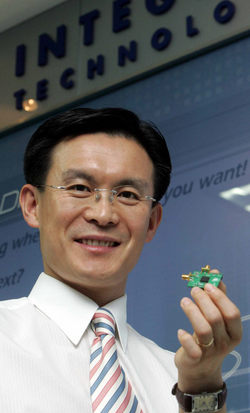 |
|
Ko Beom-kyu , CEO of Integrant Technologies, Lee Jung-yong
|
Entrepreneur’s vision becomes a reality
Five years ago, a young entrepreneur considered ways to transmit television programs onto mobile phones. Ko Beom-kyu’s resulting invention, the radio frequency (RF) chip, has enabled the manufacture of digital multimedia broadcasting (DMB) mobile phones, which can be used to watch television. The RF chip simultaneously amplifies and converts the program signals. When Mr. Ko, 38, now chief executive officer of Integrant Technologies, aproposed the idea of putting the signal-receivable module into mobile phones, some employees raised doubts. In terms of the technology available at that time, it seemed impossible to make an RF chip small enough. Some investors advised Ko not to propose such a "bold" idea. “They might have thought that my idea was nonsense when I talked about an upcoming era of TV watched on mobile phones,” Ko said. “However, I couldn’t give up, because I had confidence in the evolution of mobile devices.”In late 2002, the United States’ Intel Corp. delivered its intention of investment in the project, at a time when investors in Korea were still shunning Mr. Ko’s idea. The engineer-turned-entrepreneur led the project of coming up with the world’s smallest TV signal chip for mobile phones. Three years later, Ko’s company succeeded in producing the current chip, smaller than a fingernail and requiring half the power of its predecessors. The technology was quick to prove its commercial viability. Handset manufacturers rushed to buy the chips, as satellite-based and terrestrial DMB services started last year. Currently, 70 percent of satellite DMB phones and 50 percent of terrestrial DMB phones are equipped with Integrant’s RF chips. The future market potential is high, as well, as other mobile devices such as personal digital assistants (PDAs) and portable multimedia players (PMPs) are likely to employ the chips. "While South Korea is known as a powerhouse in mobile phones, it pays part of its handset sales to Qualcomm as royalties [for the use of their core cellular technology]," Mr. Ko said. “I, too, wanted to develop a core technology that will bring in royalties." Mr. Ko set up his company in 2000 after quitting Samsung Electronics. So far, Integrant, with about 80 employees, has won more than 110 patents related to their chip technology. Last year, Integrant reported a net profit of 7 billion won (7 million USD) on sales of 17 billion won, recovering from losses for the past three years. A month ago, Integrant won an order to supply chips to Japan. Still, Integrant is facing a long road to achieve its aim of becoming a global information-technology company.





